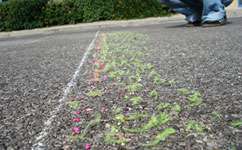Life thrives in the fast lane: Cars could have a greater impact on kerb dwelling plant life than previously thought

A team of researchers has found new evidence that the slipstream behind a moving vehicle blows seeds great distances, meaning some invasive plant species could thrive at the road side.
Led by Dr Moritz von der Lippe the study shows that the wind created in the wake of a passing car can pick up seeds, carrying them further than they would if they journeyed by more natural methods; paving the way for possibly harmful invasions.
Scientists thought that seeds scattered by cars fell back into the midde of the asphalt surface of the road. There, the inhospitable conditions are not suitable for seeds to thrive and so most transported seeds will never grow into plants.
This new study, published in PLoS ONE, revealed that when seeds are caught in the airflow behind a car, the turbulence causes them to eventually be brushed to the roadside, where grassy verges and muddy banks provide the perfect environment for them to germinate and succeed.
'The fact this process takes the seeds to the edge of the road, to somewhere that they can germinate – known as effective dispersal – that's the important part of the process,' says Proffessor James Bullock, a co-author of the study.
Dispersal of seeds is necessary for plants to survive; it prevents overcrowding and results in greater survival rates. But it can also result in certain species migrating away from their natural homes to colonise areas they haven't been found in before. If these migrating species proliferate, they can damage the ecology of the area. Some species, such as Ragwort (also known as Ragweed), are covered by laws stating they must not be allowed to spread, because their potential to cause crop losses is so great.
There has been much previous research into the dispersal of seeds by natural processes such as wind, animals and even gravity, but scientists realised that lorries, cars and other motorised vehicles can carry seeds much further than animals can.
Seeds hitchhiking on tyres or in mud stuck to cars, can travel great distances and could have huge consequences for the geography of species, especially since invasive species can often grow at the roadside. Most studies have been concerned with the distance humans and cars carry these attached seeds, as opposed to the location the seeds finally arrive at.
The study was conducted in the glamorous location of the Centre for Ecology & Hydrology's car park. The simple experiment involved lining up fluorescent-paint sprayed seeds – naturally dispersed by wind or gravity – across the car park, then getting cars to drive across the line. The scientists then had to wait until darkness to venture out with UV lights, in order to find where the seeds had dispersed to – a process that was sometimes harder than interpreting the results.
The researchers proposed a change to road shape, or a barrier to prevent seeds from being blown from the inhospitable asphalt road into the more welcoming kerb.
More information: von der Lippe, M. et al., Human-Mediated Dispersal of Seeds by the Airflow of Vehicles. PLoS ONE 8(1): e52733. doi:10.1371/journal.pone.0052733
Journal information: PLoS ONE
Provided by PlanetEarth Online
This story is republished courtesy of Planet Earth online, a free, companion website to the award-winning magazine Planet Earth published and funded by the Natural Environment Research Council (NERC).












.jpg)




